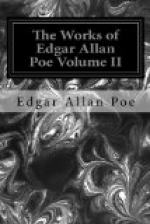P. But in all this — in this identification of mere matter with God — is there nothing of irreverence? [I was forced to repeat this question before the sleep-waker fully comprehended my meaning.]
V. Can you say why matter should be less reverenced than mind? But you forget that the matter of which I speak is, in all respects, the very “mind” or “spirit” of the schools, so far as regards its high capacities, and is, moreover, the “matter” of these schools at the same time. God, with all the powers attributed to spirit, is but the perfection of matter.
P. You assert, then, that the unparticled matter, in motion, is thought?
V. In general, this motion is the universal thought of the universal mind. This thought creates. All created things are but the thoughts of God.
P. You say, “in general.”
V. Yes. The universal mind is God. For new individualities, matter is necessary.
P. But you now speak of “mind” and “matter” as do the metaphysicians.
V. Yes — to avoid confusion. When I say “mind,” I mean the unparticled or ultimate matter; by “matter,” I intend all else.
P. You were saying that “for new individualities matter is necessary.”
V. Yes; for mind, existing unincorporate, is merely God. To create individual, thinking beings, it was necessary to incarnate portions of the divine mind. Thus man is individualized. Divested of corporate investiture, he were God. Now, the particular motion of the incarnated portions of the unparticled matter is the thought of man; as the motion of the whole is that of God.
P. You say that divested of the body man will be God?
V. [After much hesitation.] I could not have said this; it is an absurdity.
P. [Referring to my notes.] You did say that “divested of corporate investiture man were God.”
V. And this is true. Man thus divested would be God — would be unindividualized. But he can never be thus divested — at least never will be — else we must imagine an action of God returning upon itself — a purposeless and futile action. Man is a creature. Creatures are thoughts of God. It is the nature of thought to be irrevocable.
P. I do not comprehend. You say that man will never put off the body?
V. I say that he will never be bodiless.
P. Explain.
V. There are two bodies — the rudimental and the complete; corresponding with the two conditions of the worm and the butterfly. What we call “death,” is but the painful metamorphosis. Our present incarnation is progressive, preparatory, temporary. Our future is perfected, ultimate, immortal. The ultimate life is the full design.




